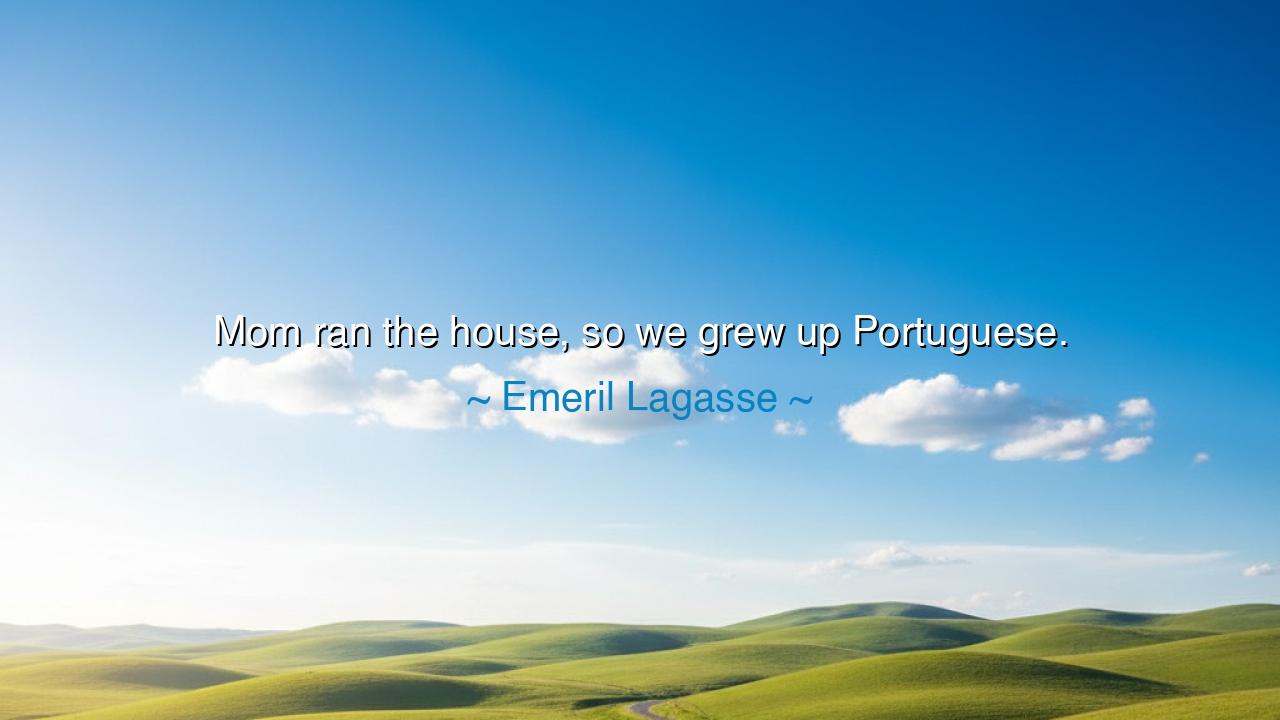
Mom ran the house, so we grew up Portuguese.






Hear, O seekers of heritage and hearth, the words of Emeril Lagasse, who spoke with love of his roots: “Mom ran the house, so we grew up Portuguese.” At first hearing, it seems a simple remark, a chef remembering his upbringing. Yet within it lies a profound truth about family, culture, and the shaping of identity: that the home is not built merely of wood and stone, but of language, food, and tradition carried forward by the hands of those who guide it.
Behold the first truth: Mom ran the house. In this, Lagasse acknowledges the power of the matriarch, the one who steers daily life, who decides what is eaten, what is spoken, and how the rhythms of family unfold. Though history often sings of kings, warriors, and men of power, it is often the mothers who mold the future in kitchens and parlors, planting seeds of culture in the hearts of children. To “run the house” is to rule a kingdom more intimate than any throne, yet no less enduring.
And so we see the second truth: we grew up Portuguese. Though born in America, Lagasse and his siblings were formed not by the soil beneath their feet, but by the culture within their home. To grow up Portuguese is to taste the foods of the homeland, to hear the music and proverbs of the ancestors, to inherit not wealth but identity. His mother’s rule ensured that the family did not drift into forgetfulness, but remained rooted in the traditions that gave them strength.
This story is not his alone, but the story of countless families who, having crossed oceans, feared the fading of their heritage. Recall the tale of the Jewish mothers of Spain during the years of exile and persecution. Though driven from their lands, it was in their homes that the prayers were whispered, the recipes preserved, the tongue of the ancestors taught to the children. Through their unseen labor, a people survived. Just as Emeril Lagasse’s mother kept Portugal alive in her home, so too have mothers across history carried nations within their kitchens and living rooms.
Thus the meaning of the quote is revealed: identity is not only given by nation or flag, but by the customs taught within the household. Governments may rule territories, but it is the family that rules memory. The flavors of a dish, the stories told at the table, the holidays observed—these become the unseen curriculum by which children are instructed in who they are. To grow up Portuguese, Italian, Chinese, or African in a distant land is often the work of mothers and fathers who insist that tradition shall not die within their walls.
The lesson is this: do not despise the small rituals of home, for they are the great builders of identity. If you are a parent, know that the songs you sing, the foods you cook, the stories you tell, are shaping your children’s souls. If you are a child, honor these gifts, for they are treasures greater than gold: they are the map to who you are and where you come from.
So I counsel you, reader: cherish your heritage, and keep alive the traditions of your ancestors. Cook the dishes of your people, learn the words of their language, ask the stories of your elders, and pass them on. For as Lagasse’s words remind us, a house is not only where we live—it is where we become. And if those who run the house are faithful, then even in foreign lands, we remain forever rooted in the soil of our beginnings.






AAdministratorAdministrator
Welcome, honored guests. Please leave a comment, we will respond soon